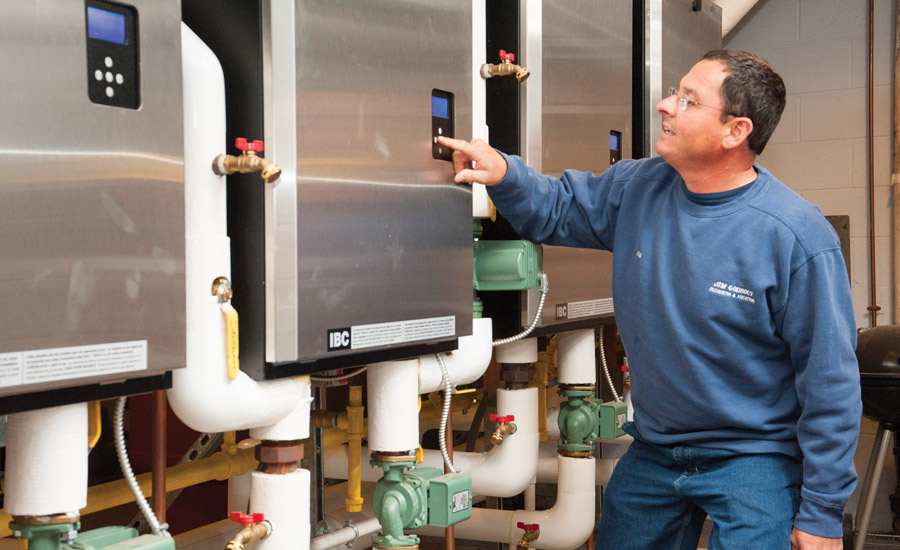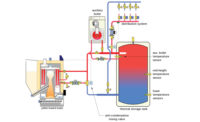For more than 30 years, I’ve watched the hydronics industry evolve. Sadly, at a time when there are so many new possibilities for water-based heating and cooling — and with a giant helping of new technology at every facet of the playing field — we’re losing the very essence of what’s needed most — a new generation of energetic, inspired young trade pros.
NEVER STOP LEARNING
As a business owner, I see that, as professionals, we can’t get by with just basics in our trade. To be at the top of our game, and to win budgets that let us do our best work, we must provide ongoing education and training for our existing employees. This is also a great way to appeal to the younger set and other trade pros, considering a career change into hydronics, by the way.
And, if we, as business owners, are doing our jobs to steer our practice and employees’ skills toward the use of better, more efficient technology, training is a must. Along with the availability of today’s highly technical equipment and system components comes the need for our hands-on trade pros to stay abreast of how best to apply it and maintain it. An example: modern, mod-con boilers — they aren’t granny’s oil-fired behemoths, smoking along at 64 percent efficiency.
Today, there’s an entire universe of new and emerging technology ready to be applied. Shame on you if you’re not making some effort to stay apprised of the newest products, technologies, and installation techniques. There are electronically commutated motor (ECM) circs that “learn” how best to perform, all sorts of hydroseparators, four-port buffer tanks to smooth-out system operation, a variety of zone valves, plug-and-play modular controls, etc. We’ve never had it so good.
Here in the New England area, the term “hydronic professional” is a staple. If you’re a plumber or HVAC technician, you’re also labeled as a hydronic professional — true or not, but mostly true. It’s become that way, mostly through the needs of our environment.
Living in a cold climate, we’ve seen — over and over — how true comfort is achieved only by circulating water all winter long. It’s not only the best and most efficient means of moving energy, it’s the most reliable. If for no other reason, New Englanders go for that.
NEED FOR NEW BLOOD
So, why are we struggling to bring new folks into the field? I place a lot of the blame on the charmed message promoted by so many high school guidance counselors that graduates make college the No. 1 goal, regardless of the $80,000 to $120,000 in loans they’ll accrue. There’s an entire unhappy army of unemployed college grads out there, waiting to be inspired.
The shortage of mechanical trades is extremely obvious in my business, every day. We’re now turning-away about one-third of the calls we receive, favoring only current customers or those within our network of customers.
It’s already nearly impossible for us to handle the existing workload because we don’t have enough technicians to go around, so, we decided to halt growth and run with the skilled labor force we have in place. This means turning away a lot of installation and service work, allowing us to meet the needs of our current customer base.
In our region, the average age of a plumber or hydronics professional is 53. So, it’s a sad irony; we’re an aging workforce providing services that our country cannot do without.
At my firm, only one of my 20 employees is under 30 years old. We’ve tried many times to hire technical school graduates, but while many are great at providing licenses and can point to some hands-on training, most lack real work ethic and experience.
A WORKING APPROACH
A few years ago, the members of our local Rotary Club and I began working with area high schools in the surrounding area to develop a couple of programs I hope and believe will build great tradesmen in our communities.
A large percentage of the new generation lacks work ethic and drive. These are tough attributes to instill. To change that, some business owners, school administrators, and I are working together on a co-op program to match students to members of the business community, much like I did many years ago.
Its approach is simple: High school students meet the basic requirements of graduation while, at the same time, learning some sort of trade. The added skills may be machining, electrical, carpentry, welding, auto repair, plumbing, or HVAC — enabling these “college prep” students to at least have some exposure to the trades. Remarkably, some of these students have discovered whole new sources of inspiration.
Mentoring also plays into this. It’s one thing for young students to have an opportunity to delve into the world of trade work, to see for themselves what’s the best match for them, and to be inspired by it. But, there’s another facet to the experience that can add tremendously to it: Matching young people with seasoned or at least semi-seasoned trade pros who can share real knowledge with them, based on experience.
Clearly, the best mentors are those who have a passion for their craft and love to share it with others.
Who are those trade pros? Think back to the teachers who most inspired you as a student. They had it going because they went the extra mile, and they truly enjoyed interacting with students. Like your passion for the craft, they had a passion for connecting with young people, right?
Did they enjoy telling stories? Did they enjoy speaking with young folks? Were they passionate about their work, and was that communicated when they spoke? Did they share an opinion that young people need exposure to the trades? Did they enjoy their job? Did they enjoy their lifestyles?
Consider, too, other parts of the equation, as well. Low self esteem at least has some roots in a student’s lack of inspiration. If inspiration doesn’t come from home, church, or school, what’s the source? Unfortunately, many know all too well that the temptation of drugs and alcohol lies right around the corner.
The consequences are awful. Drug use is at epidemic proportions in many communities across the nation. It seems that every traditional approach has been taken to avert a crisis, but it’s happening. Yet, one of the most valuable answers — a solution offering young people not only a way out, but a means to succeed and to build both skills and character — remains mostly untested. I’d yell “Give the trade a try, kids,” from the roof of my building if I thought it’d do any good.
So, please, get involved. Make a difference by developing great young leaders to carry the mechanical torch. Let’s work together to stop the downward spiral of our labor force.
Finally, a footnote: Our Rotary Club’s efforts have already begun to attract state, federal, business, and hospital support. Somewhere here is the making of an answer that may hold a solution for you, too. Start the conversation with other business pros where you are; start local and grow from there.
A favorite quote applies: “Be remembered for what you do, not what you have.”
Publication date: 10/26/2015
Want more HVAC industry news and information? Join The NEWS on Facebook, Twitter, and LinkedIn today!








